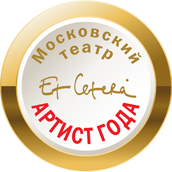24.10.2003
Getting Back to Basics in Racy Plays
John Freedman ,
"The Moscow Times"
15.10.2003
В театре “Et Cetera” стреляли
Григорий Заславский ,
"Независимая газета"
09.10.2003
Если стрелять — то сразу!
Наталия Каминская ,
"Культура"
08.10.2003
Всегда в позитиве
Алла Верди ,
www.utro.ru
08.10.2003
Стрельба по особым правилам
Алексей Филиппов ,
"Известия"
06.10.2003
Свиные ножки в До-Mажоре
Светлана Осипова ,
"Московский комсомолец"
17.05.2003
Провокации et cetera
Дмитрий Чепурных ,
"Зеркало недели"
28.01.2003
Оглянуться — и не узнать себя
Ольга Егошина ,
"Первое сентября"
Пресса
5:00
2025
2024
2023
2022
2021
2020
2019
2018
2017
2016
2015
2014
2013
2012
2011
2010
2009
2008
2007
2006
2005
2004
2003
2002
2001
2000
1999
1998
1997
1996
1995
1994
1993
0:00
Getting Back to Basics in Racy Plays
John Freedman
"The Moscow Times" ,
24.10.2003
Ooh, la, la! Zee Fr-rench! Sex! Intr-reeg! Sex! L’amour! Sex! It’s a wonder, when you think of it, that any theater would ever stage anything but French plays. As the Americans have determined scientifically, sociologically and incontrovertibly, sex sells. And does anything but sex interest the French; especially its writers? Well, give the people French sex and your theater most likely will be full every night. That certainly is what seems to be happening at the Yermolova Theater, which has unveiled an adaptation of Marcel Carné and Jacques Sigurd’s film script “The Cheats,” and at the Et Cetera Theater, where a Georges Feydeau farce, renamed as “Lucette Gauthier, or Shoot Now,” has begun what promises to be a long run. Feydeau may have found one of his most perfect matches in the Bulgarian director Alexander Morfov. Morfov is irreverent, off-the-wall and exponentially manic. His productions are overloaded with quirks and tricks and jokes that tumble over one another like droplets of water in a mountain waterfall. He has an extraordinary command of rhythm, speed and timing. His sense of humor is sharp as a tack and bold as blazes. And, in what is the key that brings that all together, he is an astute and insightful observer of the human animal. Feydeau’s play “Un Fil a la Patte,” written in 1894, is known by a multitude of divergent names in all of the languages into which it has been translated. What remains constant in all versions is the frothy, furious comedy that rattles and rolls back and forth from beginning to end. It is an ensemble piece in which almost all of the 18 characters hover near the center of the action at all times, although the high strung, self-centered but sweet cabaret singer Lucette Gauthier (Natalya Blagikh) and her harried, inconstant lover Fernand (Vladimir Skvortsov) are the play’s ***raisons d’être.*** Fernand loves Lucette but plans to marry the wealthy Viviane (Natalya Zhitkova) tomorrow. This becomes a problem when he arrives at Lucette’s theater to tell her the news. Fernand’s cowardice and Lucette’s wild entourage make his confession entirely impossible. Constantly besieged by Lucette’s stern impresario Adonis (Rushan Iksanov), her distracted former husband Chenevet (Alexei Osipov), the pompous music critic Fontaner (Sergei Tongur), her insane brother Charles (Valery Pankov), her spinster sister Marceline (Tatyana Vladimirova), a violently affectionate Bolivian general-in-exile (Pyotr Smidovich), the pathetic legal clerk Bouzin who imagines himself a poet (Alexei Chernykh) and a host of musicians, actors and dancers, Fernand is reduced to a whimpering idiot. Naturally, things get worse in the second act when Lucette shows up to sing at Fernand’s and Viviane’s engagement party. Later come various failed suicides followed by a funeral during which the corpse sings a happy, sing-along song -- but you begin to get the message. There is no catching up Feydeau; his play roars ahead at a breakneck speed, taking every corner and hairpin curve with ease and grace. This stuff is old as the hills but twice as funny. Morfov and his entire cast appear to have been born into the madness of Feydeau’s world. They wear his farce as if it were their own, handling the pratfalls, the slapstick, the acrobatics, the water pranks, the loaded glances and the comic poses with agility and style. Iksanov’s Adonis is an exemplar of inscrutable concentration and purpose as he marches about the stage. Chernykh’s wretched Bouzin, stuttering, lisping, bloody and limping from abuse, is the perfect outsider and fall guy. Pankov’s whacked-out Charles, a cross between Quasimodo and Groucho Marx, is anybody’s relative from hell. Zhitkova’s darkly enigmatic Viviane promises the pleasure of danger with every wiggle and slink of her body. Smidovich’s Bolivian general rivals George W. Bush, Jr., as a man with a passion for shooting without thinking. Morfov, who also designed the simple and versatile set of a stage on the stage, transformed this entertaining sexual farce into a tour de force of exuberant theatrical precision. His method is controlled chaos; his goal in this very good, but thoroughly conventional, play is to catch us off guard every step of the way. He almost invariably succeeds. A line of people turning into mechanical slapping machines; a waiter harassing Fernand by lobbing cubes of sugar into his overfilled coffee cup from a distance; a sudden non sequitur Italianate scene of a gondolier passing by and half-naked neighbors rudely peering in a window during a love scene – these are the kinds of theatrical surprises Morfov is constantly pulling out of his sleeve. Sacreblue, a show done this well could easily give that proverbial obscenity “light entertainment” a good name.







